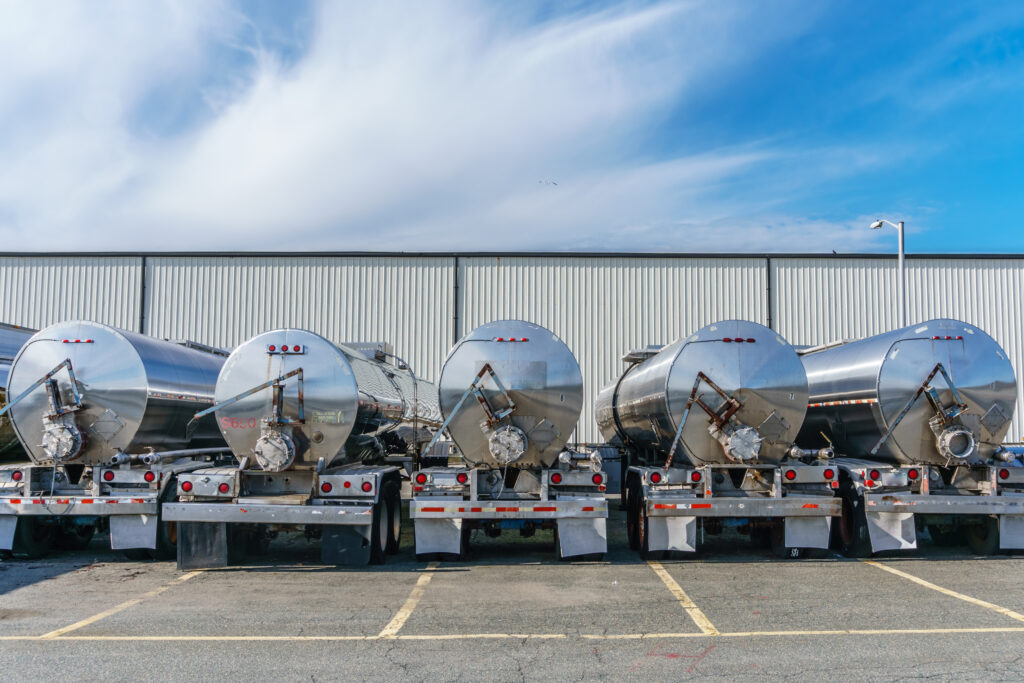How Trucking Regulations in California Affect Your Insurance Claim
Like any other motor vehicle traveling on California highways, a commercial truck driver must abide by traffic laws. In addition to this, the state has also implemented additional regulations. Here is an overview of those laws and why they significantly affect how much compensation you are entitled to following a truck accident.
What Is Considered a Commercial Vehicle?
 Generally, a “commercial vehicle” is a motor vehicle that is used or maintained for the primary purpose of transporting persons for hire, compensation, or property according to the California Vehicle Code (CVC §260).
Generally, a “commercial vehicle” is a motor vehicle that is used or maintained for the primary purpose of transporting persons for hire, compensation, or property according to the California Vehicle Code (CVC §260).
These types of vehicles must also be registered to be utilized for commercial use. Common examples include:
- Multipurpose vehicles
- Busses
- Tow trucks
- Truck tractors
- Tanker trucks
- Moving trucks
- Garbage trucks
- Construction vehicles
- Utility trucks
- Delivery trucks
Other commercial vehicles, like a pick-up truck, can be considered a commercial vehicle if it has a gross vehicle weight rating (GVWR) of less than 11,500 lbs. and is equipped with a bed that is 9 ft. in length or less.
An accident involving a truck that matches the description of any of the aforementioned descriptions will entail a complicated legal battle with the insurance companies over compensation. Allowing an experienced Bakersfield truck accident attorney to facilitate the case proceedings not only streamlines the process but significantly improves the odds of recovering a maximum settlement, as well.
Rules and Regulations for Trucking Companies
 To reduce the risk of catastrophic accidents that cause serious injuries, the Caltrans: California Department of Transportation has mandated state and federal regulations for the trucking industry. These laws keep everyone protected from reckless actions.
To reduce the risk of catastrophic accidents that cause serious injuries, the Caltrans: California Department of Transportation has mandated state and federal regulations for the trucking industry. These laws keep everyone protected from reckless actions.
However, if the regulations are violated, the responsible parties can be held liable to the highest degree. Here is an overview of the trucking regulations in California.
Truck Drivers Must Have a Commercial Driver’s License
To operate a commercial truck in California, individuals must possess a commercial driver’s license (CDL)–in addition to a standard California driver’s license.
Obtaining a CDL entails, first, securing a commercial learner’s permit (CLP), which is valid for 14 days. The individual must also pass a vision test, a medical exam, and a written knowledge test at the DMV.
Individuals with prior CDL training from another state or prior military experience may be eligible for test waivers, but this will vary.
Truck Maintenance
 Truck drivers are legally obligated to conduct thorough pre-trip and post-trip inspections to ensure the safety of their vehicles and prevent road accidents.
Truck drivers are legally obligated to conduct thorough pre-trip and post-trip inspections to ensure the safety of their vehicles and prevent road accidents.
As outlined in the California Commercial Driver Handbook, these inspections should encompass all critical components, including brakes, lights, mirrors, and the steering wheel.
Additionally, although trucks may be loaded by separate parties, it is still a truck driver’s responsibility to verify the proper securing of cargo within the first 50 miles of a trip and perform subsequent checks every 150 miles.
Lastly, any identified mechanical issues or damaged parts must be documented in a written report and repaired before the vehicle is put back into operation. Drivers are mandated to retain these reports for a minimum of 12 months.
Driving Log
The Federal Motor Carrier Safety Administration (FMCSA) mandates that every truck driver maintain detailed truck driver logs of their activities. This includes stops, rest periods, and vehicle inspection results.
A vehicle’s black box, an electronic logging device (ELD), monitors these activities. The device enhances transparency, as the data cannot be altered or falsified like it can be in a handwritten journal.
The black box also serves as substantial evidence in personal injury lawsuits involving negligence.
Dot Numbers
All commercial trucks in California that operate across state lines are mandated to register with the US Department of Transportation (USDOT) and acquire a unique vehicle identification number (VIN). This VIN must be prominently displayed on both sides of the truck for easy identification.
Truck Driver Must Follow the Hours of Service
 There are two sets of hours-of-service regulations: interstate regulations (for drivers who cross state lines) and intrastate regulations (for drivers who only operate within a single state). California truck drivers are restricted to the following Hours of Service regulations:
There are two sets of hours-of-service regulations: interstate regulations (for drivers who cross state lines) and intrastate regulations (for drivers who only operate within a single state). California truck drivers are restricted to the following Hours of Service regulations:
Intrastate Commerical Drivers
- Maximum driving time: 12 hours after 10 consecutive hours off duty
- Maximum on-duty time: 16 hours after coming on duty, following 10 consecutive hours off duty
- Maximum duty time: 70 hours in 8 consecutive days
Interstate Commercial Drivers
- Maximum driving time: 14 hours after 10 consecutive hours off duty
- Maximum on-duty time: 14 hours after coming on duty, following 11 consecutive hours off duty
- Maximum duty time: 60 to 70 hours in 7 to 8 consecutive days
- Mandatory 30-minute rest period after 8 consecutive hours on duty
The FMCSA carefully regulates the number of hours that commercial drivers can operate on a daily and weekly basis. These hours-of-service requirements are designed to ensure the safe operation of large commercial trucks and prevent fatigued driving, which is as dangerous as driving under the influence.
The Bakersfield California Highway Patrol (CHP) is responsible for enforcing the state’s HOS regulations. CHP officers can pull over commercial truck drivers and check their logs to see if they comply with the regulations. Drivers who violate the regulations can be fined and even put out of service.
Weight and Size Limitations
The maximum weight limit for a commercial truck in California is 80,000 pounds. This includes the weight of the truck itself, the cargo, and the fuel. There are also weight limits for each axle of the truck, and the maximum weight for a single axle is 20,000 pounds.
The maximum length of a commercial truck in California is 65 feet. This includes the length of the truck itself, along with the trailer.
California weight limits and size limits for commercial trucks are important for safety. Overweight and oversized trucks are more difficult to control and can pose a major safety hazard to other motorists. They also cause more wear and damage to roads and bridges.
By enforcing a weight limit and size limit, Caltrans and the CHP help to ensure the safety of all motor vehicles, while also protecting the state’s infrastructure.
The Role of Bakersfield Truck Accident Attorney
 Whether or not to hire a truck accident lawyer depends on the specific circumstances of each case. However, it’s best to at least consult with an attorney to gain more insight into case proceedings and how the legal system works when trucking companies are involved. Other factors that can benefit from legal representation include the following:
Whether or not to hire a truck accident lawyer depends on the specific circumstances of each case. However, it’s best to at least consult with an attorney to gain more insight into case proceedings and how the legal system works when trucking companies are involved. Other factors that can benefit from legal representation include the following:
- Severity of injuries: Sustaining serious injuries requires extensive medical treatment and rehabilitation. A truck accident lawyer will aid in getting their clients the best medical care in Bakersfield, as well as the maximum compensation to account for medical bills, lost wages from missing work, and pain and suffering.
- Case complexity: Tuck accident cases are naturally complex, because they can involve more than one at-fault party, like driver of the truck, trucking company, loading company, and others. A personal injury law firm will conduct an investigation and obtain evidence to identify and hold all liable parties accountable.
- Cooperation of Insurance company: Insurance companies are unlikely to offer a fair settlement upfront, often shortchanging truck accident victims the compensation they rightfully deserve. An attorney will aggressively negotiate for the highest possible settlement and take the case to court if necessary.
When to Seek Legal Help
If you have been injured in a truck accident, you may be entitled to compensation for your injuries and other damages, but it is vital to consult with a truck accident lawyer as soon as possible before the statute of limitations expires.
Our award-winning team at Horizon Accident Lawyers has recovered millions of dollars for clients throughout Southern California. We can help you file a personal injury claim against the trucking industry and get you the maximum compensation you deserve.
We specialize in motor vehicle accidents involving commercial trucks and are knowledgeable in the state’s regulations regarding licensing, truck weight limits, loading regulations, hours of service rules, and more.
Contact us today for your free case evaluation.